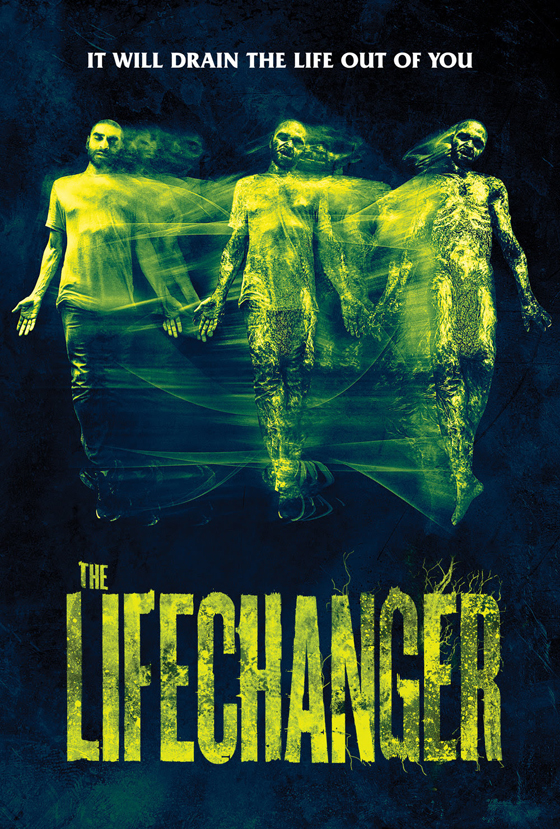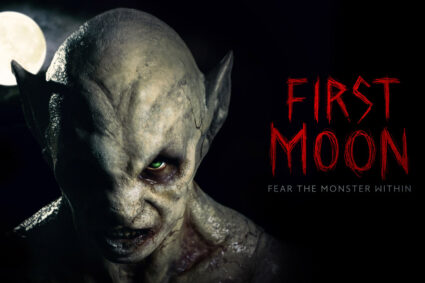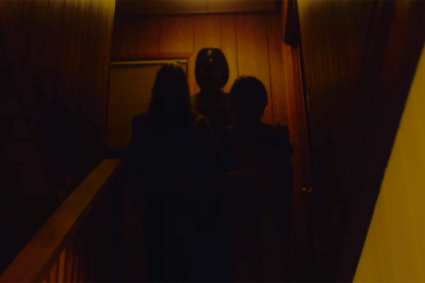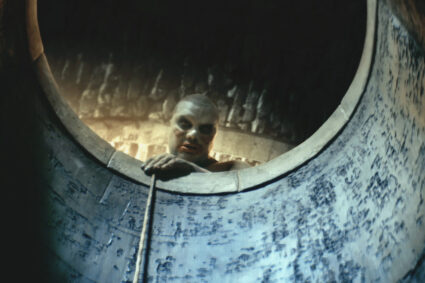
The history of horror is chock full of stories of good people who, by poor judgment or just bad luck, become monsters. The Wolfman (1941), Dr. Jekyll and Mr. Hyde (1932), and The Fly (1958 and 1986) are just a few examples. They all deliver scares, but each protagonist’s struggle to hold onto his humanity against ever mounting odds elevates the best of these films to the level of great tragedy.
Lifechanger (2018) approaches things from the other way around. It introduces us to an essentially abhorrent monster who finds himself confronting two very recognizable human problems. The first is the desire for love. This is complicated by the other, more pressing issue. It appears that he may be dying.
Drew is sort of an uber vampire. Instead of just blood, he absorbs the entire person. He is still Drew, but also retains their knowledge and memories while becoming a physical duplicate. All that remains of each victim is a desiccated husk. He continues in this state until the new body begins to decompose, signaling that it is time to glom onto a new host. The shelf life of each Drew reiteration used to last years, but now Drew’s bodies are only lasting several hours before the rotting process begins.
Fast-paced and intense, the first half hour of Lifechanger is the most engaging section of the film. Watching Drew deal with the new normal is fascinating stuff. Even though we know little about the monster at this point, the whirlwind action draws us in and we invest in finding out Drew’s fate. Director Justin McConnell expertly handles these sequences.
But there is another story that Lifechanger wants to present. That is Drew’s obsession with Julia, a troubled soul who spends most evenings holding down a seat at the Monarch Bar. Mysteriously, in body after body, Drew makes his way to the Monarch to try to connect with her. This is where for me the film becomes problematic.
To bring the audience in to this aspect of the movie we have to learn more about Drew and why he would seek love, apparently for the first time. The only possible insight we can get into Drew is through his voiceover musings sprinkled throughout the film. This proves to be an uphill climb. Comments that may be intended to provide needed character development seem self-conscious or just dumb. When Drew says, “Movies have always been a big part of my life. Something about being in that dark room,” it comes across as flat and superficial. We learn that cocaine and antibiotics slow the body erosion process. When Drew says, “The coke may serve a function, but it is still coke. It does what coke does. You take it when you want to escape yourself,” it is anything but revelatory.
By contrast, Julia is brought to life in an affecting, nuanced performance by Lora Burke. Despite the close to the surface pain of losing a young son and subsequent disappearance of her husband she displays an observant intelligence and humor. She is easy to root for, and we feel protective of her. The more we see of Drew, the more these feelings seem justified.
Lastly, the fact that Drew operates in a moral vacuum brings into question whether he can love anyone to begin with. After traipsing through his entire life treating people like gas pumps at the 7-Eleven he wants to experience love. But he is totally self-absorbed. In the opening minutes of the movie, while burning the remains of a recent victim, Drew declares in voiceover that “Love is finally just for me.” We eventually find out the reason for his attraction to Julia, and without getting into spoilers, it is kind of twisted.
****SPOILERS****
After Drew appropriates Robert, one of Julia’s friends, he does finally close the deal and a relationship begins. Somewhat illogically, Robert’s body does not begin to break down right away, and we are to believe that Drew is actually in love with Julia. We get hints where this is going when Drew intones, “When it comes to people, quality is far better than quantity.” And days later when the first signs of decomposition arrive, Drew decides to confide in Julia and reveal the whole truth about himself and his connection to her. Julia understandably thinks that Drew/Robert has flipped his lid and whips out her taser. A struggle ensues, and Julia is winning until Drew instinctively grasps her wrists and takes her into himself.
Drew is now Julia, and decides that she will be his last victim. When Julia’s body begins to break down he holes up in a bedroom, reduced to a heaving, foaming wreck, waiting for the end to come. But instead it morphs into a large embryonic sac. What slowly emerges from within is a somewhat gloopy, 70-year-old man. It is Drew. He stumbles out into the streets, the voiceover musing, as inspirational music swells, about guilt, life never ending, and not knowing who we really are. It seems totally ambiguous, but just before it cuts to the credits we hear an audio sound effect that always occurred just before Drew took a victim. So has Drew’s life actually changed? Your guess is as good as mine.
****/SPOILERS****
As I said at the start, people can become monsters. But can monsters become people? Perhaps this is the question at the heart of Lifechanger. In the world of this film my reservations about its main character compel me to say no. However, the acting, cinematography, and practical effects are first rate. This alone makes Lifechanger worth a look and hey, if you have a different view of Drew than I do, your mileage may vary.















